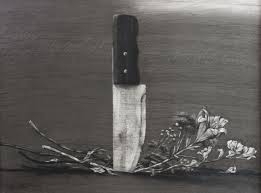Syrian authorities have released Youssef Abdelke from prison after one month and three days. No one knows the exact charge against this Syrian artist, but he has been among the few in Syria to remain true to the principles of nonviolent action, and has long warned against militarizing the protest movement.
Abdelke has now returned to his studio in the Sarouja district of Old Damascus. Many of his friends heard the news and waited for him there. “Youssef is late, is he not?” one asked nervously. Another answered, “I will dial his mobile phone.” But his number was out of service, so they called the convoy that escorted him out of the Justice Palace, and were told that Abdelke went to the barber’s, and would therefore be a little late.
I believe my detention was some kind of punishment because of my political attitudes over the years, more than it had to do with any current event.” We do not know who was feeding the pigeons in the studio’s yard, but Abdelke must have thought about this during his absence. During his imprisonment, he may have completed a painting, at least inside his mind.
In prison, Abdelke may have looked in his pockets for a charcoal pencil to finish a series of drawings he began many months ago. And almost certainly, Abdelke made a mental comparison between prison in the 1980s and now, searching his head for the traces of the rifle butt that was used to coerce him into the car that waited for him in the street – the story he told many times, perhaps not realizing it would happen again.
On Thursday, August 22, scores of lawyers and friends went to the Justice Palace in Damascus upon learning about his referral to the judiciary. At 4 pm, Abdelki was released. He emerged from the building wearing a red shirt, having visibly lost some weight and grown a beard. This prompted one of his friends, sculptor Assem Basha, to quip, “A few fatteh dishes and you’ll gain back that weight!”
At his studio, his friends were busy cleaning the old house, while the pigeons sat waiting for his arrival. Everyone was preparing to receive him as Hassan Khalifa, one of his close friends, mopped the studio’s floor with another friend.
Whenever there was movement or noise near the studio’s door, all would turn their heads. Then, at the moment Youssef put his key in the door, everyone stood up, waiting to embrace and kiss him. By now, Abdelke had gotten rid of his beard, and though he had lost about 14 kilos, his laugh clearly did not abandon his face and his eyes.
Wearing the same red shirt he had on when he was arrested, Abdelke greeted us very cordially before sitting down. He told us that the first question the interrogator asked him, sarcastically, was “Please tell us, how is Dr. Abdul-Aziz al-Khayir doing?” Youssef then laughed before he told us how he responded, also sarcastically: “Maybe al-Nusra Front took him.”
With his eyes, the artist began inspecting his studio. He let out a subdued laugh as he remembered details about the bad conditions in prison, compared to the treatment he received because of his position and status. Sometimes, he would take a phone call and reassure callers about his health, before he continued talking about the prison where military security detained him in Tartous for 25 days, before he was taken to the state security’s al-Khatib branch in Damascus, where he spent most of the period of detention.
Abdelke said, “I was arrested for my affiliation to the Communist Labor Party and the [opposition National] Coordination Committee. I believe my detention was some kind of punishment because of my political attitudes over the years, more than it had to do with any current event.”
I believe that my detention is only a small drop in the struggle of the Syrian people to restore their right to live in dignity and justice, and establish a democratic state.The Syrian artist said that he was not subjected to any physical or psychological harm. However, he spoke at length about the conditions of other detainees, pointing out that “detention conditions affecting thousands of detainees are beyond bad.”
“[The] conditions are inhumane and belong more to the middle ages than the present day, as far as things like the place of detention, ventilation, torture, and medical care are concerned,” he added.
Regarding his decision to stay in Syria, Abdelke said that any other option would be out of the question. “I will stay in my country no matter how difficult and catastrophic its circumstances are. My place is here, and I believe that it is the place of every Syrian citizen too.”
Abdelke then thanked all those who stood by him during his detention, and said, “I would like to thank all family, friends, journalists, and both political and non-political organizations that stood with me in this ordeal. I salute them from the heart, and I wish I had super powers so I could visit and embrace them one by one. Unfortunately, I don’t have such powers, so I carry it for them in my heart.”
He then concluded, “I believe that my detention is only a small drop in the struggle of the Syrian people to restore their right to live in dignity and justice, and establish a democratic state.”
This article is an edited translation from the Arabic Edition
......


